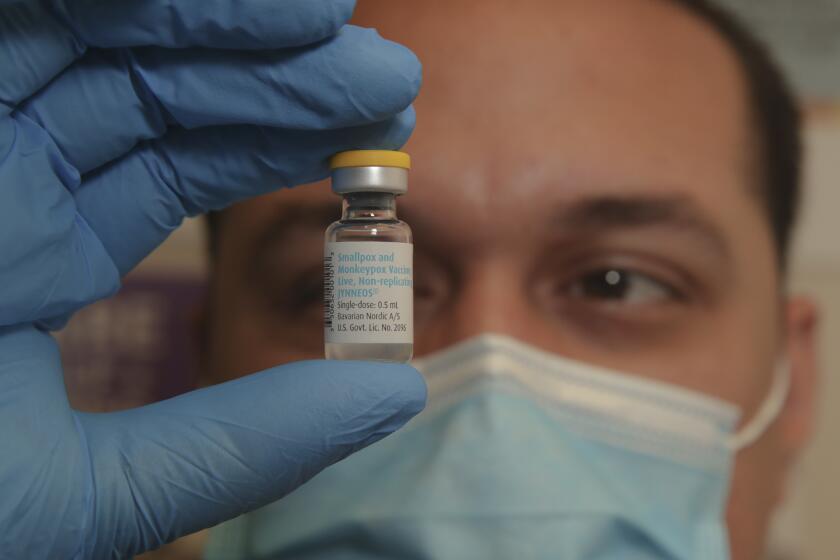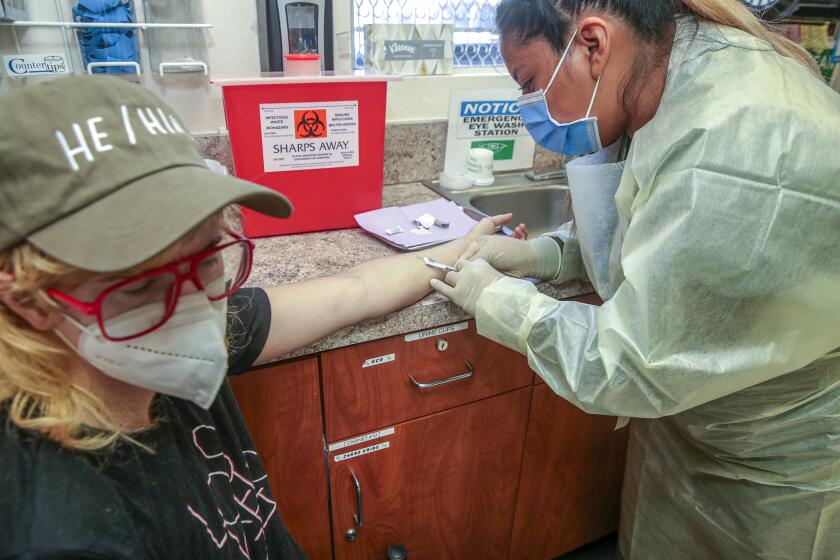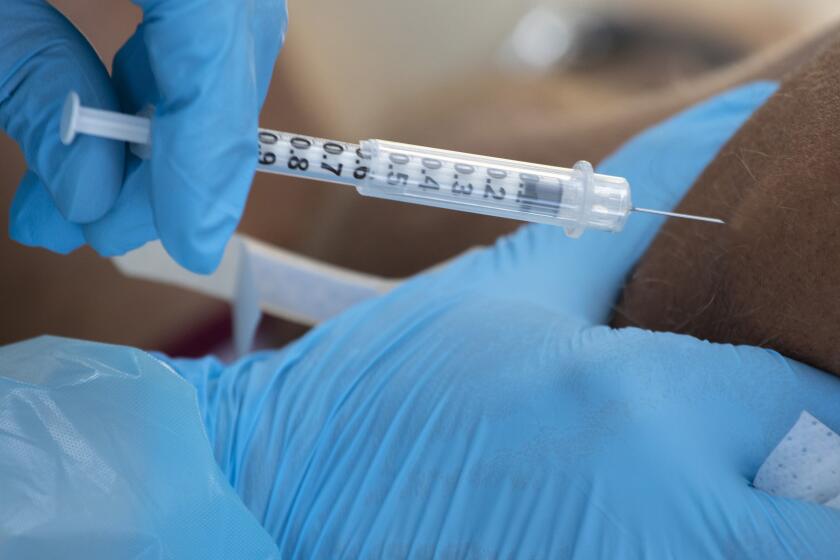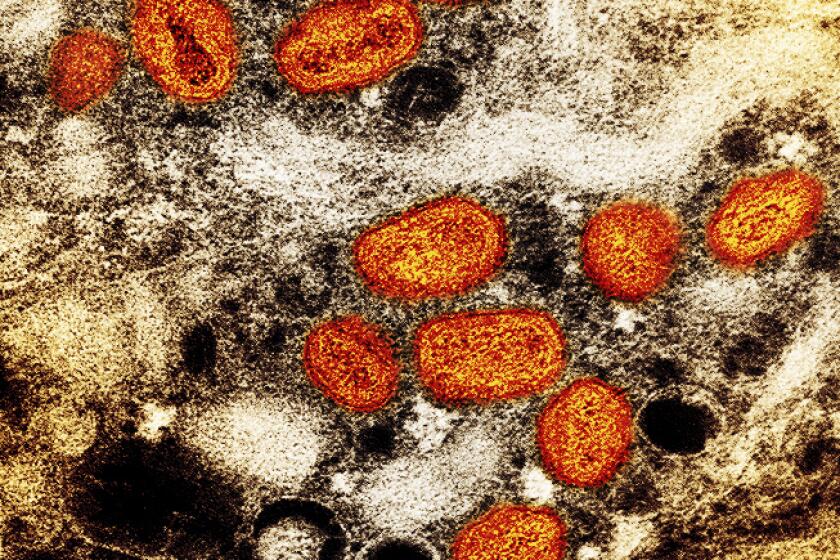MPX vaccinations, treatment dramatically slow spread of virus in California
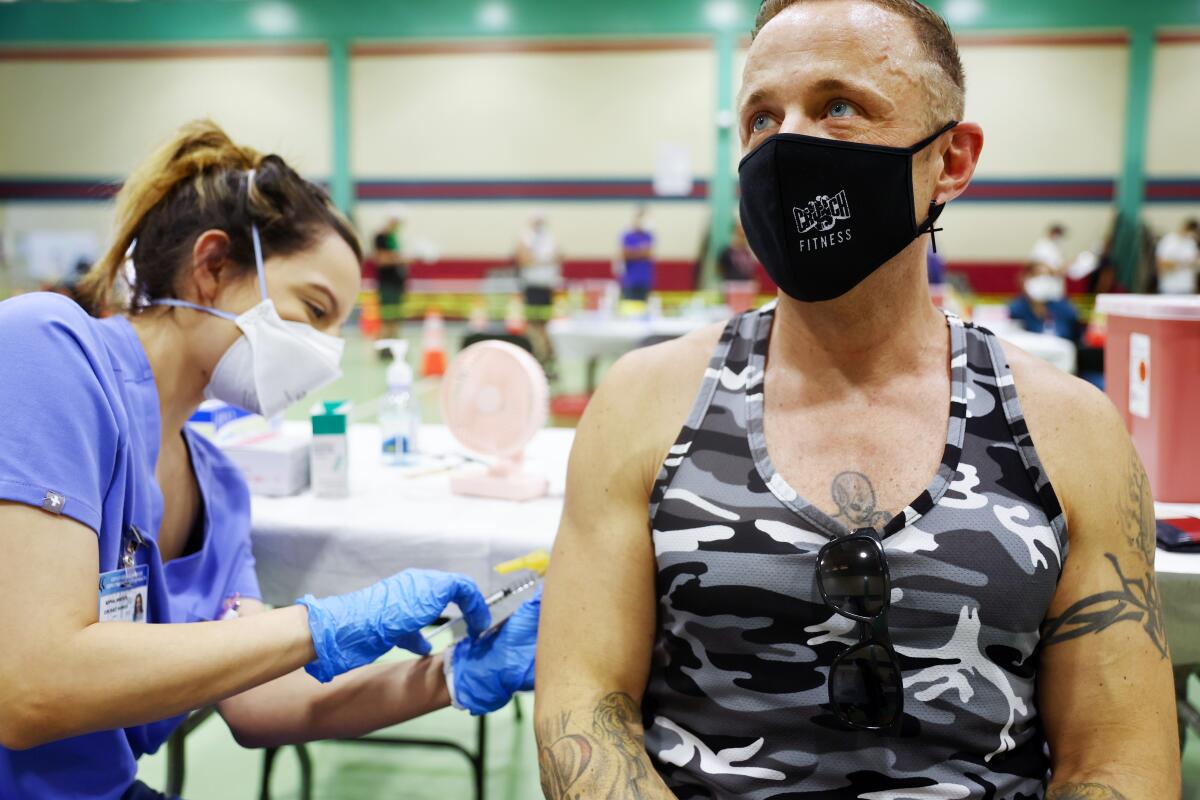
Evidence is continuing to mount that MPX vaccinations and treatments are protecting against further spread of the virus, according to Los Angeles County’s public health director.
For the week that ended Thursday, the county reported a little over 40 new MPX cases. That’s roughly the same as was reported the prior week, but it still represents the fewest number of new cases since the early weeks of the outbreak.
By contrast, during the virus’ apparent peak, more than 300 new cases of MPX — also known as monkeypox — were reported in a single seven-day period.
The decline remains apparent when cases are categorized by “episode date,” which is back-dated to when an MPX patient first had symptoms or got a first positive test. Over the seven-day period that ended Oct. 1, L.A. County recorded just 35 cases — down from 63 the prior week.
How monkeypox spreads, how to get a vaccine and more: Your frequently asked questions about monkeypox, and answers from experts.
At its peak, the seven-day period that ended Aug. 20, L.A. County reported 287 MPX cases.
Since the start of the outbreak, L.A. County has reported 2,314 MPX cases, health data show.
“New cases in L.A. County ... continue to plateau and actually decline,” county Public Health Director Barbara Ferrer said during a recent briefing. “There is mounting evidence that shows that vaccinations and antiviral treatment are key protective measures that can protect individuals and help to slow the spread of monkeypox in L.A. County.”
The local declines, she added, “are consistent with a slowing growth rate in the United States and in a number of other countries.”
More than 5,300 probable and confirmed MPX cases had been reported statewide as of Friday. However, the weekly tally of newly reported cases has fallen sharply since peaking in early August.
In Los Angeles County, new weekly MPX cases are now one-sixth of what they were at the peak, thanks to vaccinations and suspected long-lasting immunity for survivors.
Experts have said it also appears that once a person is infected with MPX and recovers, immunity can last quite a while. That’s an important distinction compared with the coronavirus, where naturally induced immunity can wane in a matter of weeks or months.
In San Francisco, the average number of newly reported daily MPX cases has fallen to fewer than one, health officials said. The city’s public health emergency declaration for MPX will end Monday.
“The overwhelming community support and advocacy for critical resources such as vaccines from the federal government, coupled with early and strong action, drove San Francisco’s successful public health response and enabled the city to reach this milestone,” the San Francisco Department of Public Health said in a statement.
MPX cases have primarily been among gay and bisexual men, as well as other men or transgender people who have sex with men. But anyone can get MPX, including family members of those who have been infected in the context of a household exposure.
In Los Angeles County, the median age of those infected with MPX is about 35.
Vaccines for MPX are now easier to get. Los Angeles County has expanded eligibility, and you can get a shot at one of several walk-up clinics.
Unlike the early weeks of the outbreak, there is plentiful supply of the Jynneos vaccine for MPX. By the first week of October, L.A. County had administered more than 100,000 vaccination doses.
Still, there is more work to do to expand vaccine coverage. L.A. County estimates there are 150,000 to 170,000 people at higher risk for MPX infection in the county. And to be fully vaccinated, people need two doses.
San Francisco health officials also reiterated that MPX remains a public health concern as it continues to circulate. They urged higher-risk people to complete the two-dose inoculation regimen.
While health officials believe many higher-risk people have also decreased riskier behavior in response to MPX, “it’s also really important that people continue to avail themselves of the vaccine,” Ferrer said.
One group for whom Ferrer would like to see higher levels of vaccine coverage is residents who have HIV.
“It turns out that illness severity is closely tracking with people whose HIV infections are not well-controlled. So the recommendation is for everybody who’s HIV positive to come in and get vaccinated, regardless of gender,” she said.
Advocates say the early years of the HIV/AIDS epidemic is a reminder of how men of color may face racism and stigma when it comes to MPX.
Tpoxx — the antiviral medication that can be used to treat MPX — is also readily available at more than 500 sites, Ferrer said, “so there’s not an access problem getting Tpoxx in L.A. County.”
MPX is more commonly transmitted during intimate encounters, including sex. The disease is characterized by virus-filled rashes and lesions that can look like pimples, bumps or blisters. The rashes or lesions can appear first in the genital area and rectum before spreading to other body parts, and because they can be mistaken for other skin issues, the virus can easily spread during intimate encounters. Risk is higher for people with multiple sexual partners.
MPX also can be transmitted in household settings.
Most MPX cases include mild to moderate illness, but 5% of cases in L.A. County have resulted in hospitalization. One L.A. County resident died of MPX; the person was severely immunocompromised.
A Los Angeles County resident has died due to monkeypox, also known as MPX — the nation’s first confirmed fatality linked to the disease.
A rare complication of MPX can be disease in the eye. In a report published by the U.S. Centers for Disease Control and Prevention, officials described five cases of MPX in the eye, with patients experiencing prolonged illness and impaired vision.
“Patients with signs and symptoms compatible with ocular monkeypox should be considered for urgent ophthalmologic evaluation and treatment. Prompt notification of public health officials can help support these efforts,” the report said.
Officials said people with MPX should wash their hands frequently, avoid touching their eyes and stop using contact lenses.
More to Read
Sign up for Essential California
The most important California stories and recommendations in your inbox every morning.
You may occasionally receive promotional content from the Los Angeles Times.
